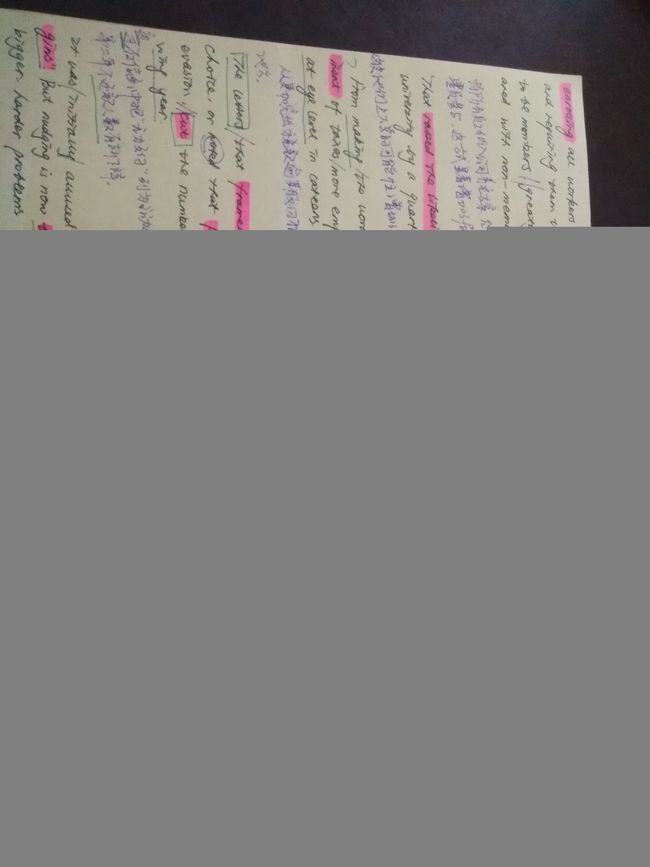nudge: a slight push or shake.
shove: a strong push.
nurture: to help a plan, idea, feeling etc to develop.
aspiration: a strong desire to have or achieve something. syn: ambition.
initiative: an important new plan or process to achieve a particular aim or to solve a particular problem.
the initiative: if you have or take the initiat join a school, profession etc atve, you are in a position to control a situation and decide what to do next.
intake: the number of people who joetc at a particular tin a school, profession at a
particular time.
intake of breath: a sudden act of breathing in, especially when you are shocked.
other people’s feelings. 铁腕手段
quota: an official limit on the number or amount of something that is allowed in a particular period.
roll out: to make a new product available for people to buy to buy or use.
fade: or fade away. to gradually disappear
fade into insignificance: to seem unimportant.
fade in/out: to appear/disappear slowly or become louder/quieter, or to make a picture or sound do this.
stray: to begin to deal with or think about a different subject from the main one, without intending to do it.
to move away from the place you sholud be.
manipulation: to make someone think ad behave exactly as you want them to, by skillully deceiving or influencing them.
rest on: rely on/depend on/lie in
by and large: used when talking generally about someone or something.
allay (somebodys) fear/concern/suspicion etc: to make someone feel less afraid, worried etc.
iterative: to say or do something again. (formal)
gain ground: to become more successful. antonym: lose ground
If an idea, belief gains ground, more people start to accept it.
to get closer to someone or esomething you are competing with.
genesis: the beginning or origin of sometnghing.
inherent: a quality that is inherent in something is a natural part of it and can not be separate from it.
dedicated: made for or used for only one particular purpose.
predate: to happen or exist earlier in history than something else.
tweak: to make small changes to a machine, vehicle, or system in order to improve the way it works.
default: the usual and expected way in which something is done, unless you decide to do something different. 默认
by default: 弃权
in default of something: (formal) because of the lack or absence of something.
opt out: to avoid doing a duty.
to decide not to be part of a group or system.
tax return: document giving the tax controllor information about taxpayer’s tax ability. 纳税申报单
emphatic: expressing an opinion, idea etc in a clear, strong, way to show its importance.
emphatic win/victoy/defeat: a win etc in which one team or player by a large amount.
draw on/upon: to use information, experience, knowledge etc for a particular purpose.
frame: (foraml) to organize and develop a plan, system.
(formal) to carefully plan the way you are going to ask a question, make a
statement etc.
pay up: to pay money that you owe, especialy when you do not want to or you are
late.
evasion: when you deliberately avoid dong something hat you should do, or paying
amount of money that you should pay.
take-up: the rate at whoch people accept something that is offered to them.
screening: medical tests that are done on a lot of people to make sure that they do
not have a particular disease.
tinker: to make small changes to something in order to repair it or make it work
better,
margin:
margin of error: the degree to which a calculation might or can be wrong.
margin for error: how many mistakes you can make and still be able to achieve something,
on the margin(s): a person on the margins of a situation or group has very little power, importance, or influence.
bring somebody/something to: to make someone become invovled in a discussion or situation.
to cause someone or something to be in a particualr situation.
roll out the scheme: 实施这一方案
behavioural science: 行为科学
gain good marks: 取得不错的成绩
progress (v) to university: 继续到大学学习.
impose quotas: 设置限额
mental shortcuts: 心理捷径
shape brand perception: 树立品牌观念
the sickly (adj) sibling to economics: 经济学的病态同胞
raise the likelihood: 增加可能性
late payment: 逾期付款
publc bodies: 公共机构
police forces: 警备力量
1. nudge (theory): a concept inbehavioural science,political theoryandeconomicswhich proposespositive reinforcementand indirect suggestions to try to achieve non-forcedcompliancetoinfluencethe motives, incentives anddecision makingof groups and individuals. The theory claims to be at least as effective, if not more effective, than direct instruction, legislation, or enforcement. The concept has influenced British and American politicians.
A nudge, as we will use the term, is any aspect of thechoice architecturethat alters people's behavior in a predictable way without forbidding any options or significantly changing their economic incentives. To count as a mere nudge, the intervention must be easy and cheap to avoid. Nudges are not mandates. Putting fruit at eye level counts as a nudge. Banning junk food does not.
2. Choice architectureis the design of different ways in which choices can be presented to consumers, and the impact of that presentation on consumerdecision-making.
3. TheBehavioural Insights Team(BIT), also known unofficially as the "Nudge Unit", is an organisation that was set up to applynudge theory(behavioural economics and psychology) to try to improve government policy and services as well as to save theUK governmentmoney.


